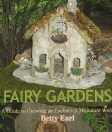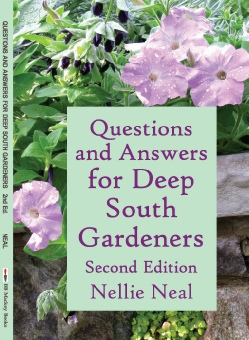Website and Images © 2014 Betty Mackey
Something Special in Garden Books





Questions and Answers for Deep South Gardeners
QUESTIONS AND ANSWERS FOR DEEP SOUTH GARDENERS, Second Edition. By Nellie Neal.
Help for Deep South Gardeners is here, with Nellie Neal's book of real questions from gardeners and their answers. She is known as the GardenMama to her many fans, and her garden advice really works. It is rare for someone to be so funny and so correct all at the same time! And the questions themselves may make you laugh in recognition.
The chapters cover fall, winter, spring, and summer, each with chores and tips for the season, and, the heart of the book, many questions straight from the talk show, with expanded answers. The new edition has more questions and an all-year pruning calendar and guide.
In his review of the book, the late and deeply missed Jim Wilson, former co-host of "The Victory Garden" on PBS, says, "Nellie Neal's gardening advice is as southern as live oaks festooned with Spanish moss. With wit and wisdom she answers tough questions gleaned from years of give and take with southern gardeners. From turnip greens to tropical hibiscus...if you have a question, she has the answer."
Excerpts from Questions and Answers for Deep South Gardeners
In the Deep South, you need flowers that can take the heat. Here are Nellie Neal's picks for great summer annuals that perform:
bacopa (Sutera grandiflora)
fanflower (Scaveola aemula)
impatiens (I. wallerana)
zinnia, classic and narrow-leaf (Z. elegans, Z. angustifolia)
Petunia Wave series
surfinias (such as Million Bells)
celosias: chenille, feather, and cockscomb
coleus (Solenostemon or Coleus species
Cleome hasslerana
melampodium (M. paludosum Derby and others);
purple fountain grass (Pennisetum setaceum ‘Rubrum’).
Sample Questions and their Answers
Recognizing Roses
Q. Can you identify a rose I saw and really want? It is a shrub type, with reddish leaves and flowers that are yellow,orange, and rosy pink all at the same time.
A. Though I never claim to be psychic, I believe the rose you seek is known as the butterfly rose (Rosa mutabilis). A wonderful, nearly carefree garden shrub, each flower progresses through the colors with age, producing the tricolor effect you describe. I like its reddish new growth and flat-faced blossoms. If you like flowers that change with age, look for Yesterday, Today and Tomorrow. This is not a rose, but Brunfelsia australis, a large tropical shrub that blooms well in containers. Its flowers open violet, then lighten to lavender,and are finally white. It’s a beauty.
Aggravating Azaleas
Q. I planted a hundred azaleas last year and they grew fine, but never made flowers this year. Do you know what happened and how I can prevent it next year?
A. So long as the site for the azaleas has about half a day of sun,there are two likely causes for your problem: fertilizer and pruning. Perhaps you amended the bed with organic matter properly, but didn’t use an azalea fertilizer on the plants. That would provide plenty of leaves but few flowers. Or perhaps you pruned them too late in the year and cut off the buds for this year. Fertilize this season and don’t prune at all, then look for flowers next spring.
Awful Armadillos
Q. There are armadillos digging up my lawn and I don’t want to shoot them. Do you have any ideas for running them off?
A. Traditional wisdom says they’re looking for food and you’ve got it, so there they are. Armadillos are more opportunistic than moles and other digging vermin—it's not just your garden they want. They'll walk a mile for a bowl of pet food or overripe fruit sitting on top of the compost pile. Clean up your area, and hope your armadillo isn't a female. Oonce they have had a litter in your garage, they get territorial and may have to be trapped and hauled away.
Suitable Seed Names
Q. What is the real name of a big seed my friend gave me? She called it monkey balls but I'm sure it has another name I can give to my garden club when I recommend it.
A. Yes, it does. The heart-shaped leaves of Discorea bulbifera and the tubers it produces in the leaf axils give rise to many common names, including the one you find inappropriate for some ears. Call it tater vine or air potato and no one will blush.
